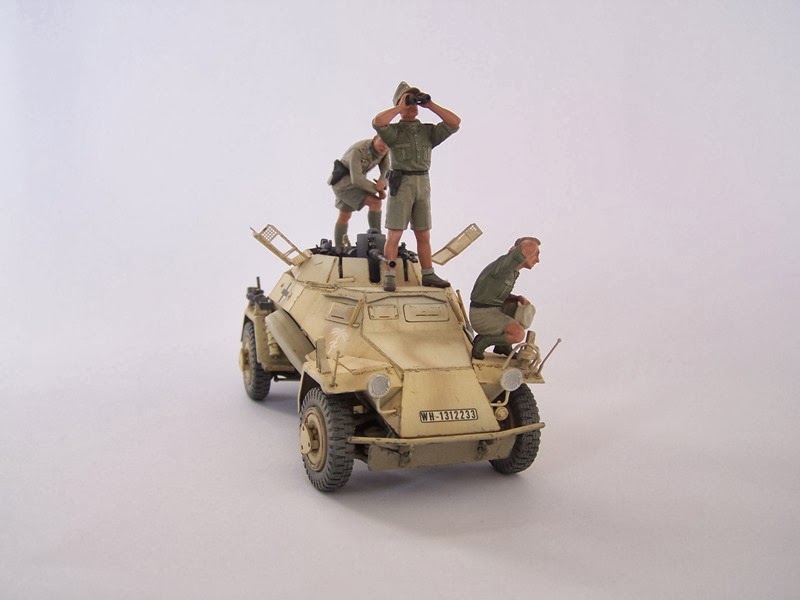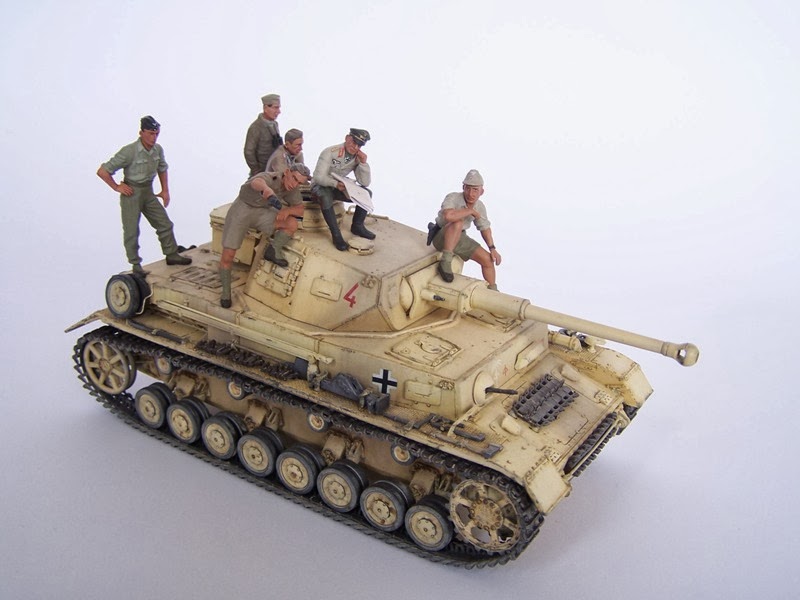Finished model of that torpedo plane of the early Pacific theater of WW2-battle of Coral sea. Very nice kit, fitting is very good, Gunze paints used, markings are homemade templates.
Sunday, 26 January 2014
Fw 190D-9 1/48 EDUARD
I'm starting the build of that interesting plane, one of my favorite. Nice surface details of that kit, but joining the wings to fuselage is not very good, so some putty is needed. Also the photo etch of the control panels in the cockpit is more bluish and I don't like it so much. MG 131 are metal barrels from RB Model.
Sunday, 19 January 2014
1/35 Sd.Kfz.263 Schwerer Panzerfunkwagen (8 Rad), AFV Club 35263
Introduction
The Sd.kfz.
263 Panzerfunkwagen (8Rad) is a heavy, but fast armored car for reconnaissance
and communication. It is based on the chassis of earlier variant- Sd.Kfz.232
Panzerspahwagen. It is 8-wheeled car with omitted turret, instead a larger
welded combat compartment was installed, to accommodate maps and radio
equipment. It had also a square antenna and retractable one (umbrella type) on
top of the vehicle, the armament consisted of only one machine gun with 750
rounds in front of the armored car for self-defense. A total of 207 were
produced, issued mainly in reconnaissance or signal battalions in armored
divisions.
Review
Until now,
there was no plastic kit of that rare vehicle in 1/35, but AFV Club filled that
gap recently. It is based on their earlier Sd.kfz. 232 model, with new parts
for the turretless top and the antennas.
Contents
The kit is
in a standard box with nice box art, showing a desert camouflaged vehicle. In the box we have the following:
-8 sprues
of tan styrene
-1 piece
for the chassis
-2 separate
pieces for the hull
-1 small
clear sprue
-8 vinyl
tires
-2 small
vinyl sprues with driveshaft boots
-2 small
photo etched frets
-1 small
decal sheet
-1
instruction booklet
-1 poster
size A4 with the box art
Sprue “A”: two
pieces-with the elements of the wheels, suspension, levers, shafts etc
Sprue “B”: lower part of the hull, engine, other parts of
the transmission
Sprue “C”:
side parts of the hull, various hatches
Sprue “D”:
mudguards, various boxes, exhausts, two shovels
Part “I”: one
piece for the frame of the chassis, packed separately for preventing damage
Part”E”:
two pieces for the main parts of the hull
Sprue”H”:
clear parts for headlights etc.
Sprue “L”:
parts for the two type of antennas
Sprue “N”:
elements for the front shield
Sprue “M”:
one part for the turetless top of the hull
Parts G1
and G2: photo etched frets
Part J: decal
sheet
Parts T:
vinyl driveshaft boots and tires
The
moulding of the parts is excellent with no flash and crisp details. Starting
with the chassis we have a very detailed transmission and suspension (shafts,
levers and so), which is workable in fact and the wheels can be positioned on
uneven terrain, for dioramas for example.
You should be careful though, because there are many tiny and fragile
parts that can be easily broken. There’s
basic engine, consisting only of the lower half which is petty if you want to
leave the hatches open. Two fuel tanks are also provided.
The next
component is the hull-the lower part is consisting of bottom and two sides. An
angled frame is provided for correctly positioning and holding those parts.
There’s interior included, but no engine compartment. Also no radio equipment
is present, which is surprising considering this is a radio car. The top of the
hull is consisting three parts with nice details and weld representation. All
hatches can be positioned open or close, if you decide to put some crew in the
vehicle or interior to be seen. There are optional parts for building initial
or early version.
Next step
is building the wheels-each wheel is consisted of brake drum and hub carrier
plus a vinyl tire. They can be positioned straight or steered. For easy
handling is better not to put the assembled wheels in this stage.
Mudguards
are angled and have various tools and boxes stored on them. There’s also a flag
staff on the front left mudguard-this was included only for initial production
series.
Front shield
is also included-it is optional for some vehicles and has acceptable thickness,
but if you want can be replaced with photo etched one.
Antennas are
two types-framed and umbrella type. They
are very well represented, but attention is required, because are very fragile.
The umbrella type may be positioned stretched, which will look pretty
impressive once deployed.
Two small
photo etched frets are included for various small details.
Instruction
is comprehensive, clear, with all steps very clear. The color chart is with
numbers for Gunze, Humbrol,revel and Lifecolor paints.
Four
different camouflage options are provided, but in black and white type scheme-colored
will be preferrable. Decal sheet is printed well, clear, with various crosses
and markings.
-7th
Pz.Div., Russia 1941 in overall German grey
-3rd
Recon.Bn., 21st Pz.Div., Libya 1941 in overall Sandy yellow
-7th
Pz.Div., France 1940 in overall German grey
-4th
Pz.Div., Poland 1939 in overall German grey
Conclusion
I like this
rare vehicle and the AFV Club done very good job of representing it, with crisp
moulding and details. My only criticism is the omission of radio equipment for
the interior, engine compartment, also adding some figures would be nice. For
me the icing of the cake is the umbrella type antenna, which fully deployed,
will look rather impressive.
Thursday, 16 January 2014
1/35 Deutsches Afrika korps(DAK), Tunisia-dorama ; PART 1
I'm presenting a diorama, on which I'm working since a while. It's a German DAK vehicles, heading towards Kasserine pass, stopping for a rest and fill some fresh water from the well. Panzer IV is from Dragon, Sdkfz.222 is from Hobbyboss, figures-Masterbox and some scratch palms and water well.
Subscribe to:
Comments (Atom)


























































